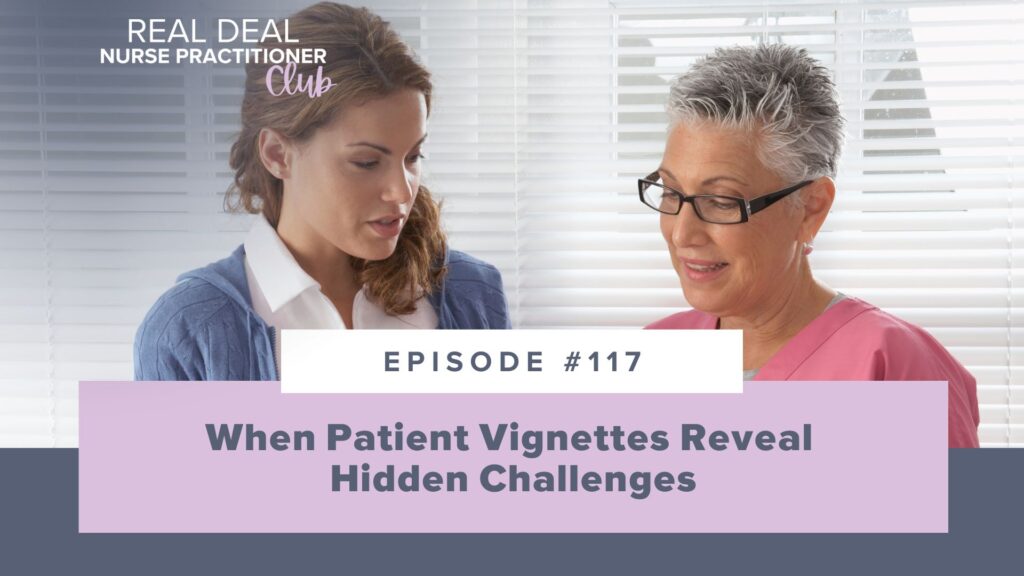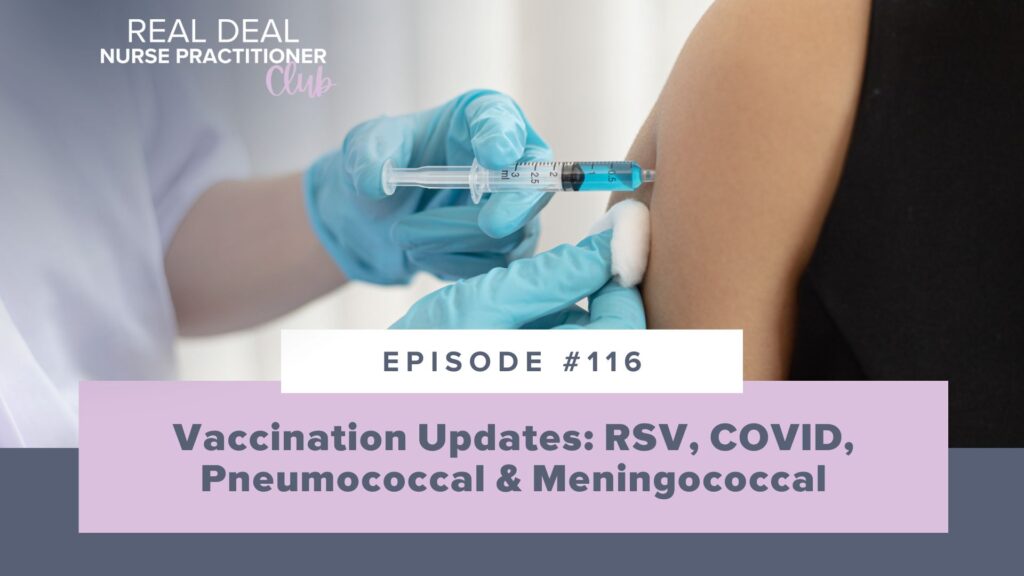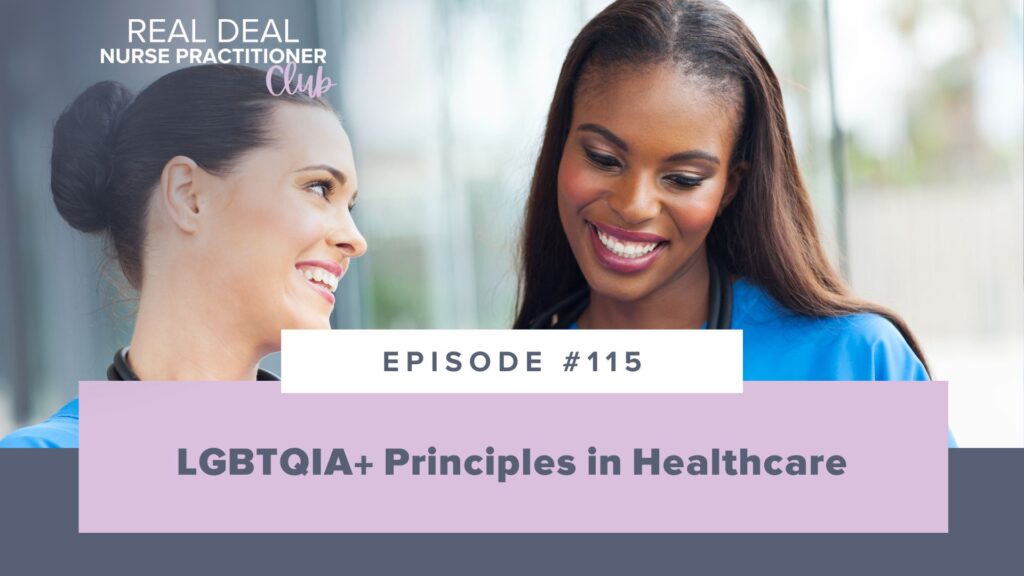Ep #102: A Step-By-Step Guide to the Credentialing Process
- by
- Dec 13, 2023
- Podcasts
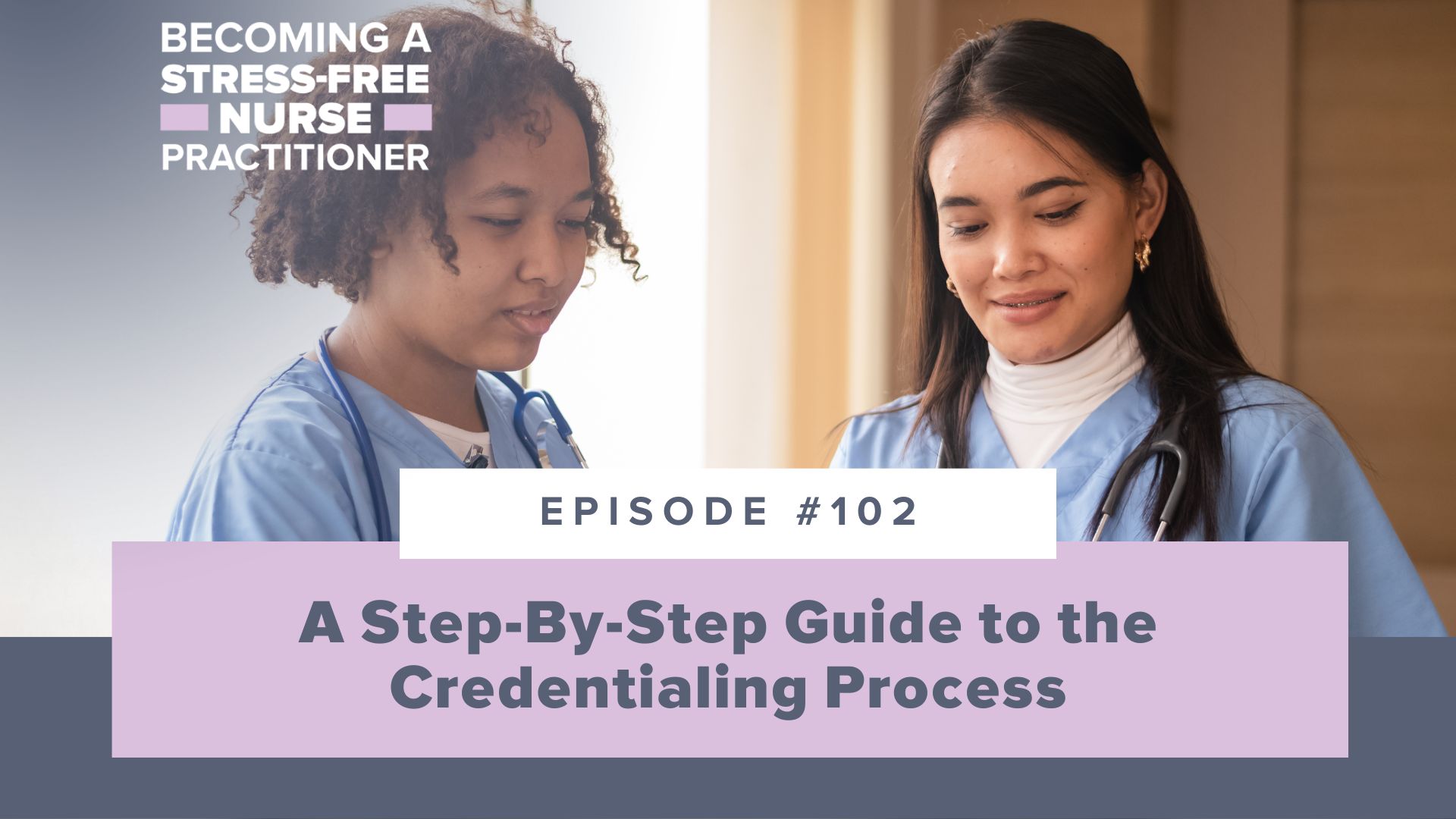
If you’re currently preparing to graduate or have just passed your board certification exam, you might be wondering, “Now what?” This is a common question we receive all the time, and once again, I am joined by Anna to guide you through the next steps.
You’ve graduated, passed your boards, and the next critical step is licensing and credentialing. This can feel like a huge time-consuming hurdle you have to overcome on your journey to becoming a real-deal Nurse Practitioner. Although it seems complicated, NP certification and licensure are essential. Tune in to find out everything you need to know.
Join us on this episode as Anna and I review the Nurse Practitioner licensing and credentialing requirements and offer you a step-by-step guide through that process. You’ll hear important considerations to keep in mind as they relate to your state, common mistakes to avoid, and additional tasks you may need to complete before you become a real-deal NP.
If you’re looking for support, no matter what phase of your nurse practitioner journey you’re currently in, I have communities available for both students and new nurse practitioners. In these communities, we work to uplift one another and grow this profession together every day. Interested? Click here if you’re a student and click here if you’re a new NP!
What You Will Discover:
- Why licensure is important, and the difference between your license and certification.
- A general overview of licensing requirements.
- How to find the relevant licensing information for your state.
- A step-by-step guide to the licensing and credentialing process.
- Some of the most common mistakes to avoid.
Featured on the Show:
- Follow me on: Facebook | Instagram | YouTube | TikTok
- NCSBN: National Council of State Boards of Nursing
Full Episode Transcript:

Welcome to Becoming a Stress-Free Nurse Practitioner, a show for new NPs and students that want to pass their board exam the first time and make that transition from RN to NP as seamless as possible. I’m your host Sarah Michelle. Now, let’s dive into today’s episode.
Sarah: Hey y’all, the topic today that we are going to be covering is about navigating your licensing and credentialing journey. We get the question all the time, “I passed my boards, but now what?” And applying for your license and getting credentialed is another critical step before starting your first job as a real deal nurse practitioner.
This is going to be helpful information whether you are preparing to graduate or if you just passed your board certification exam. And, as always, I have Anna joining me today to help walk through this process as well.
Anna: For sure, sometimes credentialing can just feel like this huge time consuming hurdle you have to get over. But you’ve graduated, you’ve passed your boards and then you have to wait because next up is credentialing.
So today, we’re going to go step-by-step through that credentialing process, including why our licensure is important, a general overview of our licensure requirements, and then how to find that information for your state. And then the additional tasks needed for credentialing.
Sarah: Yeah, so let’s just kind of start out by going over why licensure is important, because your license and your certification are a little bit different, but both are requirements for your new role as a real deal NP.
So you hold a license as a registered nurse, but now you need a license to practice as a nurse practitioner too. And what is the significance of holding that license? Well, it demonstrates that you have the minimum knowledge and experience required to practice as a safe and competent nurse practitioner.
Anna: Yeah, I think competence is really the key word there. Remember, you do not need to know everything possible as a nurse practitioner. But your board certification and your state licensure signature signifies that you have the knowledge to practice safely. Now, remember your license is granted from your state board of nursing and it just allows you to practice within your scope.
Sarah: Exactly. And then when you become a certified and licensed nurse practitioner, that really means something. It says to your patients that you will care for them safely and be able to provide quality care. It goes back to our standards of practice as nurse practitioners that says that we need to be able to practice independently and in coordination with other healthcare professionals to provide that comprehensive patient-centered care.
Anna: Yeah, and I think that nurse practitioner license, it can open up so many opportunities, right? If you want to open your own practice, you need one. If you want to prescribe medications, you need one. Pretty much any patient-facing NP role will require that license. And as we’ll get into, the requirements of renewing the license will also demonstrate that cycle of lifelong learning and staying up to date with evidence-based clinical practice.
Sarah: So before you become licensed, there is this general checklist of things that you need to do. So I think that would be a good thing to discuss. First and foremost, you need to graduate from an accredited nurse practitioner program.
And you can complete that as a master’s degree or an MSN, or as a post Master’s certificate if you already have that master’s degree in nursing. Or you could graduate with a Doctor of Nursing Practice, a DNP, with that advanced practice focus. And then once you graduate, you can sit for and pass your board certification exam.
Anna: Yes, so the board exam is what earns you that certification when you pass. I know these terms can get a little confusing, but as a primary care nurse practitioner, you’re certified through either AANP or ANCC. And those are national certifications that can be used for any state for your license.
And so just to clarify here, you are nationally certified in your specialty, and then you are licensed by the state you work in to care for patients and practice as an NP.
Sarah: Yeah, that’s a very important distinction. Certification and licensure are two different things. And then once you pass your boards, you can apply to the State Board of Nursing for that NP license. This is where it gets a little bit tricky, a little bit overwhelming.
And although the board exam is a nationally accepted test to allow you to become licensed, each state has their own additional requirements for licensure. So it’s so important for you to make sure that you are aware of your state’s requirements, and they will be listed on that State Board of Nursing website and typically include things like different fees, proof of graduation, proof of passing, proof of that malpractice insurance, and possibly some continuing education requirements too.
Anna: Yeah, I think in my state I even had to get fingerprints done for mine.
Sarah: Yeah.
Anna: And depending on your state, that will also determine the initials you can put after your name, so keep that in mind. When you’re signing your name with your new NP initials, make sure you’re just using the correct abbreviation. So for example, some states refer to NPs as certified registered nurse practitioners, or CRNPs. Other states, they are advanced practice registered nurses, so APRNs. Or simply advanced practice nurses, APNs.
Sarah: Yeah, that’s why it’s important to look at what is happening in your state. And I know it’s confusing that each state is different, and it’s even more confusing if you hold licensure in multiple states or if you’re moving and need to change your license. So make sure that you understand how to navigate the state’s Board of Nursing website. But know that there’s always helpful links and contact information for people to reach out to, too.
Anna: Yes, I have been that person moving and switching licenses from different states. And a great resource to check out if you’re really unsure where to start is the National Council of State Boards of Nursing or the NCSBN, right? All of the boards of nursing for the 50 states and other US territories are members of the NCSBN.
The NCSBN, if you’ll remember, is that independent agency that allows for boards of nursing to collaborate and promote their common interests, and it also oversees nursing board exams like the NCLEX.
Sarah: Yeah, that’s a really great tip. That website, the NCSBN, has a lot of helpful information, including the Nurse Practice Act for each state and how to get started with licensure in each state. And so once you’ve reviewed your State Board of Nursing requirements and you’re ready to get this licensing process started, the first thing to submit is usually that verification of your education.
So that will come directly from the school that you graduated from. And if you’re going to be practicing in a state other than where your program is located, you should be in contact with that program coordinator to make sure that the education verification form is sent to the correct state board of nursing too.
Anna: Yeah, luckily most state boards of nursing have moved in the direction of electronic tracking of your application. So you usually are able to see what has been submitted, what parts of the application are outstanding, whether or not your application is being reviewed. And unfortunately, again depending on the state, and depending on the volume of applications they’re processing, the initial licensure period can take anywhere from two to upwards of eight weeks. So patience is key.
Sarah: Yes, definitely have patience. I know it’s hard when you’re so excited to get going as a real deal nurse practitioner. I remember that feeling so well, but it does take time for state boards to verify everything. And that is why you want to make sure that you thoroughly read through all the directions and the needed materials before you start that application. You don’t want to have your license delayed because of a silly mistake or an oversight.
And once again, write down the contact information for your State Board of Nursing. If you ever have a question along the way, reach out to them directly as they are going to be the best ones to assist you in moving forward.
Let’s fast forward a bit to when you officially become a licensed nurse practitioner. So that really depends on what your job requires. If you will be submitting any billing claims for the patient care you provide, you are going to need an NPI number. NPI stands for National Provider Identifier and it is a 10 digit number unique to you that is registered within the Department of Human Services. Basically, it just allows for a quick way to identify you as a provider in healthcare without having to lose all of your credentials, licensing information, et cetera.
Anna: Yeah, you’ll apply for that NPI number through the National Provider and Plan Enumeration System or NPPES website. You’ll also need information about your clinical practice site, so definitely work closely with your office manager or anything like that to help complete the application. It will ask for an address which is public information, and so we highly, highly recommend putting the address of the practice that you are going to be working at.
Sarah: And another task too to be aware of that you may need to complete, especially if you’re going to be prescribing medications, which is almost every job, is a prescriptive authority license. That’s a little bit state dependent as some states allow for independent nurse practitioner practice. But in states where there are restrictions on NP practice, a prescriptive authority agreement or license allows for you to prescribe medications under the supervision of a physician.
Anna: Yeah, so again, review your state’s NP scope of practice, review the State Board of Nursing regulations and also related to a prescriptive authority is the need for a DEA number. This is another unique identifier for you, except this one is registered with the Drug Enforcement Agency. So a DEA number allows you to prescribe controlled substances.
And remember, controlled substances are rated from category one, which is the most restrictive, through category five. And although a DEA number allows you to prescribe those, your state’s scope of practice or your prescriptive authority can be more restrictive.
Sarah: Yeah, so it’s just another time to make sure you understand your state’s regulations. The main reason for the DEA number is to allow for monitoring and regulation of those controlled drugs. And most NPs can prescribe categories two through five. Part of the application checklist for a DEA number is verification of state licensure, including any prescriptive authority agreements, if that’s required by your state. And so getting your DEA number is later in that licensure and credentialing process, for sure.
And so we’ve talked a lot about the different requirements that you need as a nurse practitioner to practice, so let’s go over some common mistakes and how to avoid them. So Anna, what is one thing you want to talk about to start off with?
Anna: I think you might have touched on this one already, but one big mistake I hear new NPs make is that they don’t read all the requirements before starting the different applications. A common issue that delays the license and credentialing is just not filling out a form completely or incorrectly, even if it’s just a little silly mistake. And that can cost precious time and delay your start date.
So we cannot emphasize enough how important it is to review all the checklists and all your necessary information and paperwork before submitting these applications.
Sarah: Yeah, I know it feels silly that we keep mentioning to make sure you fill everything out correctly, but I cannot tell you how many students have had their new licenses delayed just by missing one teeny tiny box. Because it’s not always like the State Board of Nursing is going to tell you you’re missing that one thing, it will be on you to figure it out most of the time.
And another thing that you need is to allow yourself enough time to get all this credentialing work done. I had no idea of this when I first started. I was so excited to sign that first contract and I signed it the first week of August with that tentative start date of October 1st. And I was really surprised, and thankfully my employer had a whole credentialing department that made the process super smooth, moved things along very efficiently. But you can expect credentialing to take anywhere from 60 to 90 days.
Anna: Yes, it can literally take months. And it could be long, painful months when you just want to start. But luckily a lot of employers will have a credentialing department or the office manager handle that credentialing for you, which is what is allowing you to bill for your services.
And then one more thing to remember here is that you cannot practice until your license and credentialing is complete. I know that might sound like a no-brainer, but don’t get caught up in like, well my application is in and I know I submitted everything I need to, so it’s fine.
If you practice without the proper license or without the proper credentialing, you really can set yourself up for a lawsuit.
Sarah: That’s such a good point. So make sure you’re paying attention to the details, you’re allowing for adequate time and do not practice before those credentials are complete. And then the last thing here, let’s fast forward to your first license renewal. Time is just flying by on this episode. So you need to know the timeline for renewal for each individual license and certification.
For example, your board certification through your ANCC needs to be renewed every five years. Your state license might need to be renewed every year or every two to three years. And that DEA license is renewed every three years.
Anna: Yes. And don’t forget you must maintain your RN license and your nurse practitioner license. So my RN license I have to renew every year. My NP license I have to renew every other year. My certification is every five years. And we get that question a lot from students and recent graduates, so just make sure you are following the requirements for all of those licenses.
Sarah: Absolutely. And when preparing for renewal, you need to know the requirements and the costs. I highly recommend making yourself a binder or some sort of tool to keep track of those CE certificates and make notations of the costs and any other requirements needed.
Most licenses require a certain amount of continuing education credits with a minimum number in pharmacology and also a practice hour requirement. For example, AANP requires 1,000 practice hours and 100 continuing education credits with at least 25 credits in pharmacology.
Anna: Yeah, and definitely look up those certification renewal requirements and your license renewal requirements, because they are getting more and more flexible with their practice hours or other ways that you can renew if you’re not in practice. So just another tip there.
And another good tip here that I absolutely have to do is upload the completed contact hour certificate to your board certification account, like the second you complete them. It will save you so much time when you go to renew.
And make sure you start the renewal process for any of your licenses a little bit in advance, like usually 30 to 60 days in advance because you don’t want to hit a delay in processes that causes your license to expire and then you can’t practice for a time. So do not procrastinate this.
Sarah: All right, y’all, we have talked about so much today, I don’t think we can fit anything else into this episode.
Although it might seem complicated, NP certification and licensure is essential for us to demonstrate that we are safe and competent advanced practice nursing providers. And as you approach graduation or start applying for that first NP license, listen to this podcast again if you get stuck, if you need a little bit of a refresher, just even to tease those two terms apart again. And Anna, what was a key takeaway for you?
Anna: I just cannot stress enough the importance of being proactive and informed about this process, right? Review your state, review your specific state requirements, reach out to them with questions, work with your new employer, utilize their credentialing department, utilize the office manager and just stay on top of the requirements.
Sarah: For sure. And I’m just going to say again, if you need to re-listen to this episode as you’re first dipping your toes into figuring out this process, it does get easier as you renew and go forward in the future. But the first time can be a little bit of a doozy. And that wraps up this episode, my friends. We will be talking to you very, very soon.
As an extra bonus, friends, if you’re looking for support no matter what phase of your nurse practitioner journey you’re currently in, I have communities available for both students and new nurse practitioners. In these communities, we work to uplift one another and grow this profession together every single day. Links to join will be included for you in the show notes.
Thanks for listening to Becoming a Stress-Free Nurse Practitioner. If you want more information about the different types of support we offer to students and new NPs, visit npreviews.com/resources. See you next week.
Enjoy the Show?
- Don’t miss an episode: follow the podcast on Spotify, Apple Podcasts, Google Podcasts, or RSS.
Search the Blog
Join our Facebook Group!
Get FREE support and encouragement from thousands of FNP/AGPCNP students and our NP Support team.
Learn More3 Study Hacks to Conquer Your NP Exam!
Download these tips that have helped thousands of students pass their NP board exams.
Download NowInstitutional Partnerships
Are you a faculty member and would like to bring Sarah Michelle’s resources to your school? Email us at nursinggroups@blueprintprep.com for special institutional pricing or click on the link below to learn more.
Learn MoreGroup Discounts
Are you a student and have 10 or more classmates interested in purchasing Sarah Michelle’s courses? Email us at nursinggroups@blueprintprep.com for special pricing.
